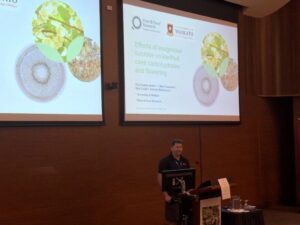So, there’s another election gone – and hopefully we don’t have to think about another one for three years – or will it be four by then!
We have a change of government, with many people possibly thinking that now it is over, they can get back to business as usual. However, for those of us in the ag and hort science sector, and the university sector in particular, the question is more about whether business as usual is really what we want, or need, and is business as usual actually delivering or even fit for purpose?
The problems within the New Zealand university sector continue with the recent proposal from Massey University to cut and consolidate courses with the loss of academic positions. For some, it is simply a question of money and giving the universities greater funding. However, before rushing in to that, shouldn’t we first consider what we require from our universities?

Whilst each university is rightly trying to balance its books, there seems to be no co-ordination among the universities, or sufficiently strong and clear direction from the government, in the provision of degrees of value to New Zealand – or even that set the student up for a future career. When students now pay so much in tuition fees, is there little wonder that many are taking a transactional approach to the degree to the point of the experience being reduced to ‘purchasing’ of a degree, rather than the concept of studying to be awarded the degree on the passing of exams. While some students may go to university purely out of interest, the majority regard the costs incurred as an investment in their future employment, and earning, prospects.
To this end, what do we the ag and hort science sector (and as part of the general tax paying public) want from the universities? The list can be long – quality of teaching and final student knowledge, degrees with a realistic prospect of improved employment prospects, education of students to meet the future needs of New Zealand, integration with research, operating within financial boundaries and hopefully not saddling students with a large debt for a degree with little prospect of achieving a job to pay off that debt. New Zealand is not alone in facing these issues. Perhaps it is time to start considering the wider perspectives of the university sector, and not simply view students as individual packets of university revenue.
At present it seems that the major tool the universities are using to manage their financial bottom line is to cut courses, and hence academic staff, and the more expensive science courses or specialist science teams are obvious targets compared with the more lecture theatre based, or on-line, courses, which are cheaper to run, despite current differences in funding from government. While some universities are selling off assets, one could ask whether that is sustainable beyond paying for the current loss when the underlying system creating the problem remains unchanged? So long as each university is allowed to operate purely off the financial bottom line, with little co-ordination or consideration of the needs of New Zealand, or their students, there is little likelihood of change.
So, for our corporate members – where are your future scientists going to come from to staff the ag and hort CRIs? Likewise, for our commercial company members – as ag and hort industries are rapidly becoming more technical, where are your future staff going to come from to give you that competitive advantage? Consider that the lack of graduates or post-graduates in some science disciplines is a global not just New Zealand phenomenon. Importing scientists is not always an option – and anyway, is that a desirable solution?
To this end, the recent election is irrelevant, as the problem is there for whoever is in power to solve, and simply throwing money into an ever-deeper hole is unlikely to be a long-term, sustainable solution
 Conference Report
Conference Report
from Dr Kris Kramer-Walter who received the 2023 NZIAHS Postgraduate Award
I received the 2023 NZIAHS Postgraduate Award to attend the 7th International Plant Dormancy Symposium in Perth, Western Australia in September 2023. It was attended by approximately 70 scientists from around the world, with a large contingent of Australian researchers.
Presentations covered a wide range of topics including pre-harvest sprouting of grains, maintaining dormancy in stored potatoes, dormancy satisfaction modelling, lichen dehydration tolerance, hormone and metabolite networks, reactive oxygen species, epigenetics and transcriptomics. I was the last presenter of the conference and received the ‘best presentation by an early career researcher’ award for my talk on “Effects of exogenous sucrose on kiwifruit cane carbohydrates and flowering”.
This conference increased my awareness of the scope of plant dormancy research outside of woody perennials and the exciting work being done in a range of species. I connected with several researchers who were investigating the interplay between ABA, cytokinins, strigalactones and sugar availability, and this research is very relevant to my own experiments in kiwifruit and the wider issue of warming winters for chill-dependent crops grown in New Zealand.

Last Chance to Register“Building Resilient Production Systems” The topic has been chosen because of the devastation wreaked by Cyclone Gabrielle illustrated failings in the resilience of not just our physical infrastructure, our land management systems, and communications systems, but also illustrated how many of our key primary industries are less resilient than they may need to be in future. This forum will address the resilience of our agricultural and horticultural production systems, with emphasis on not just the systems themselves, but also on the resilience of their supporting infrastructure, science, and financial systems. Link for the Programme and to register: https://agscience.org.nz/event/2023-nziahs-canterbury-forum-building-resilient-production-systems/ |
Applications are open for theNew Zealand Horticultural Science Advancement Trust2023 Funding RoundClosing date 31st October 2023 |
| We have brought forward the 2023 closing date to 31st October 2023 to accommodate our members who are wanting to attend and present at the IX International Symposium on Kiwifruit in February 2024. Members are welcome to apply for funding for other conferences in this round. Link to application form: https://agscience.org.nz/membership/awards/nz-horticultural-science-advancement-trust-award/We are holding a special funding round next year closing date 31st March 2024 for the Postharvest 2024 / Posharvest Pathology / F+V Health specifically for members seeking funding to present at these concurrent symposia |
.












